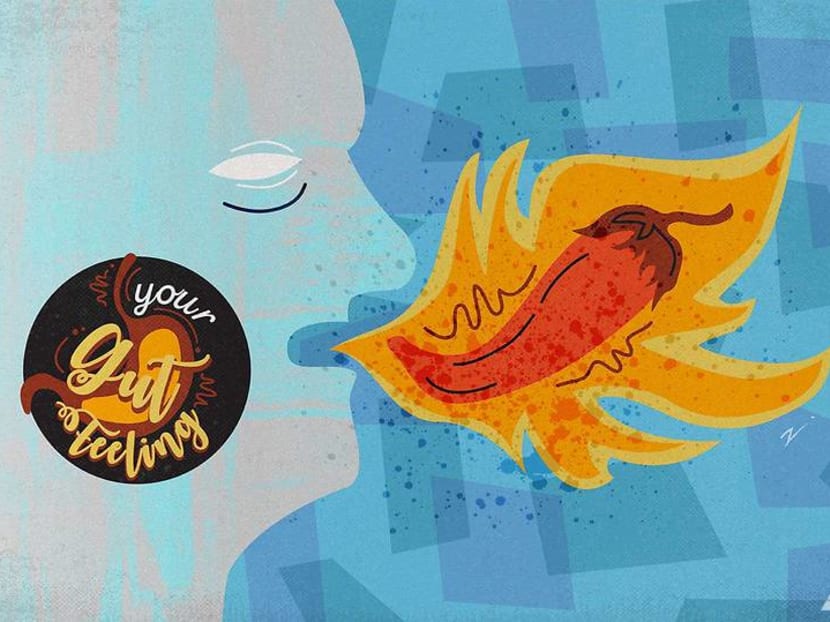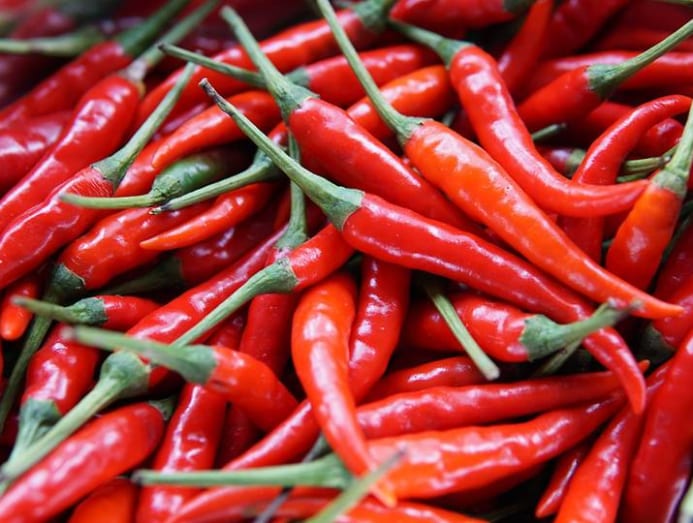Can't eat too much spicy food these days? The link between getting old and chilli
In this new series on digestive health, CNA Lifestyle finds out why you experience more gastrointestinal issues the older you get. We’re kicking off with spicy food – and why it doesn't agree with you as much nowadays.

(Art: Chern Ling)
It wasn’t so long ago when slurping up spicy ramyeon (the spicier, the better) on a weekly basis and digging into the cheeses of a charcuterie platter did not faze you – or your digestive system – even a little bit.
But as more candles appear on your ice cream birthday cake, well, you may even have to reconsider eating said cake if you don't want to make a beeline for the bathroom after a slice.
Eating is one of the greatest pleasures in life, and you might feel like your body has let you down when your gastrointestinal system starts to turn in a less-than-stellar performance as you age. So, what is happening to you?
In this new series, CNA Lifestyle highlights a different digestive issue that some of us may just be starting to grapple with and what you can do to feel better.
This week, we kick off with your increasing intolerance for spicy food.

WHAT’S HAPPENING IN MY GUT?
It’s not just your lips, tongue and mouth that feel the kick when you’re eating spicy food.
There are receptors throughout your gastrointestinal (GI) tract that can detect capsaicin, the chemical in chilli, paprika, peppers, and various spicy ingredients, that create the burning sensation, said Dr Andrew Ong, a consultant with Singapore General Hospital’s Department of Gastroenterology & Hepatology.
READ: Love chilli? You might be a thrill-seeker – with a lower risk of heart disease
That explains why you may feel abdominal pain, diarrhoea, and a scorching sensation in the stomach after a mala hotpot dinner – along with the afterburn in the anus the day after on the toilet. Yes, those receptors are present in the anus, too.
As for why you have diarrhoea, those same capsaicin-detecting receptors are also found in your small intestine as well as colon or large intestine – and they, too, can sense the burn. As a defence mechanism, they go into overdrive to get the spicy food out of you fast.

But because the waste material moves so quickly through your colon, there is not enough time for it to do its job: Absorb water from the waste. The result? The infamous watery stools otherwise known as diarrhoea.
WHY IS IT ONLY HAPPENING NOW THAT I’M OLDER?
For one, the middle-agers are more likely to start treatments for chronic diseases such as high cholesterol and high blood pressure, said Dr Ong.
“Some of the side effects of these medications may also irritate the GI tract to predispose patients to be more sensitive to the effects of spicy food.”
READ: Is the heat getting to you? Eating spicy food cools you down better than ice cream
Secondly, if you're part of the Sandwich Generation – supporting children and elderly parents – you may be under more stress than other Singaporeans.
And that may explain why you may find your stomach acting up even with a smidge of sambal belacan. “Studies have shown that stress lowers the pain threshold of the GI tract. Thus, patients undergoing stressful situations are more likely to perceive symptoms,” said Dr Ong.
Another possibility? “As Asians have changed their diets to include westernised ones over the years, we have become less exposed to spicy food and therefore have a lower tolerance while consuming it,” said Dr Ong.
WHAT’S THE SOLUTION?
The best treatment is to eat spicy food in moderation, especially if the symptoms are severe, advised Dr Ong. If your inability to tolerate chilli is due to the lack of practice, give your body some time to adapt to it again. “You may be able to desensitise yourself by taking spicy food regularly over some time; this is, however, subject to your tolerance of the symptoms when they do occur.”
What about the use of antacids to put out the burn in the gut? Should you? While some studies show that capsaicin may drive acid production in the stomach, said Dr Ong, there is little evidence that antacids help. Though the soothing effects of antacids may help reduce some of the discomforts, he added.
You might be better off taking medications such as omeprazole to reduce acid production. “But it works best only when it is taken half hour before meals,” said Dr Ong.





